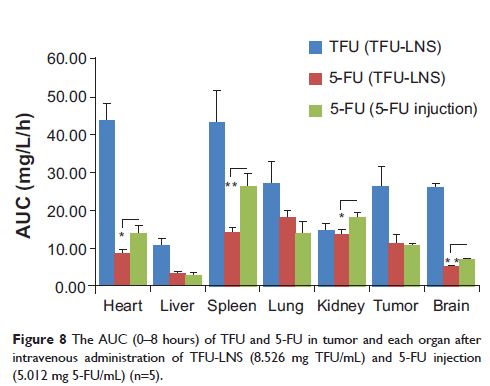9 0 5 7 8
论文已发表
注册即可获取德孚的最新动态
IF 收录期刊
- 2.6 Breast Cancer (Dove Med Press)
- 3.9 Clin Epidemiol
- 3.3 Cancer Manag Res
- 3.9 Infect Drug Resist
- 3.6 Clin Interv Aging
- 4.8 Drug Des Dev Ther
- 2.8 Int J Chronic Obstr
- 8.0 Int J Nanomed
- 2.3 Int J Women's Health
- 3.2 Neuropsych Dis Treat
- 4.0 OncoTargets Ther
- 2.2 Patient Prefer Adher
- 2.8 Ther Clin Risk Manag
- 2.7 J Pain Res
- 3.3 Diabet Metab Synd Ob
- 4.3 Psychol Res Behav Ma
- 3.4 Nat Sci Sleep
- 1.9 Pharmgenomics Pers Med
- 3.5 Risk Manag Healthc Policy
- 4.5 J Inflamm Res
- 2.3 Int J Gen Med
- 4.1 J Hepatocell Carcinoma
- 3.2 J Asthma Allergy
- 2.3 Clin Cosmet Investig Dermatol
- 3.3 J Multidiscip Healthc

已发表论文
在 H22 小鼠中使用 N3-O-甲苯酰氟脲嘧啶的脂质纳米混悬剂进行的临床前研究
Authors Zhang J, Li M, Liu Z, Wang L, Liu Y, Zhang N
Published Date May 2014 Volume 2014:9(1) Pages 2741—2751
DOI http://dx.doi.org/10.2147/IJN.S59338
Received 17 December 2013, Accepted 15 February 2014, Published 29 May 2014
Purpose: N3-O-toluyl-fluorouracil (TFU) is a potential antitumor prodrug of 5-fluorouracil (5-FU), but its poor solubility has limited its use in clinic. This study aimed to improve the bioavailability of TFU by preparing TFU-loaded lipid-based nanosuspensions (TFU-LNS) and perform a preclinical evaluation.
Methods: TFU-LNS were prepared through high-pressure homogenization and were lyophilized afterwards. For in vitro test, the physicochemical properties and cytotoxicity against HegG2 cells were conducted. For in vivo evaluation, the pharmacokinetics, tissue distribution, and antitumor efficacy were investigated in H22-bearing Kunming mice.
Results: TFU showed different degradability in four media; in particular, nearly all of it converted to an equimolar amount of 5-FU in blank plasma of Wistar rats. The lyophilized TFU-LNS had a mean particle size of 180.03±3.11 nm and zeta potential of –8.02±1.43 mV and showed no discernible changes after storage at 4°C for 3 months. In the in vivo antitumor study, the antitumor efficacy of TFU-LNS was consistent with that of 5-FU injection. Furthermore, TFU-LNS released a lower concentration of 5-FU in heart and kidney throughout the tissue distribution studies.
Conclusion: TFU-LNS exhibited convincing antitumor activity and easy scale-up opportunity, which suggests that TFU-LNS might be a promising drug delivery system for cancer therapy.
Keywords: 5-fluorouracil, high-pressure homogenization, cytotoxicity, cancer therapy
Methods: TFU-LNS were prepared through high-pressure homogenization and were lyophilized afterwards. For in vitro test, the physicochemical properties and cytotoxicity against HegG2 cells were conducted. For in vivo evaluation, the pharmacokinetics, tissue distribution, and antitumor efficacy were investigated in H22-bearing Kunming mice.
Results: TFU showed different degradability in four media; in particular, nearly all of it converted to an equimolar amount of 5-FU in blank plasma of Wistar rats. The lyophilized TFU-LNS had a mean particle size of 180.03±3.11 nm and zeta potential of –8.02±1.43 mV and showed no discernible changes after storage at 4°C for 3 months. In the in vivo antitumor study, the antitumor efficacy of TFU-LNS was consistent with that of 5-FU injection. Furthermore, TFU-LNS released a lower concentration of 5-FU in heart and kidney throughout the tissue distribution studies.
Conclusion: TFU-LNS exhibited convincing antitumor activity and easy scale-up opportunity, which suggests that TFU-LNS might be a promising drug delivery system for cancer therapy.
Keywords: 5-fluorouracil, high-pressure homogenization, cytotoxicity, cancer therapy
